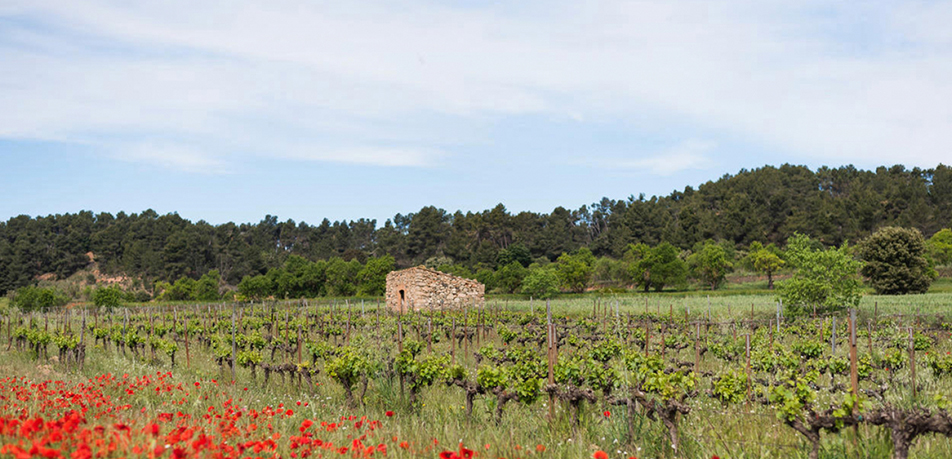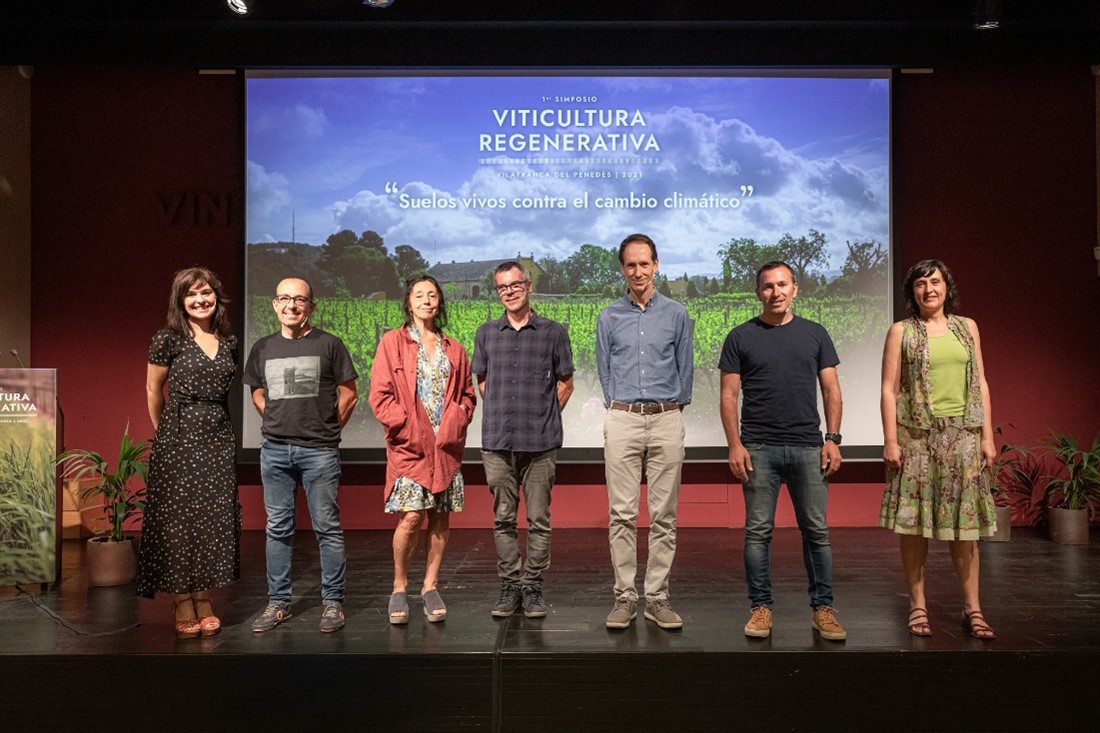REGENERATIVE VITICULTURE

Coinciding with the World Day to Combat Desertification and Drought, held annually on 17 June, Familia Torres organized the First Regenerative Viticulture Conference. Participating in the event were renowned national and international experts who urged a swift transition to this model, which has shown immense environmental benefits in the current climatic context. Below we'll take a look at some of the conference highlights.

Speakers at the First Regenerative Viticulture Conference held on 17 June 2021 in Vilafranca del Penedès.
Regenerative agriculture helps sequester CO2, brings soils back to life, and halts erosion.
What is regenerative viticulture, what does it entail, and how can it mitigate the effects of climate change?
- The principles of regenerative viticulture are aimed at bringing soils back to life by imitating nature. The more life exists in the soils, the greater their capacity to draw CO2 from the atmosphere and in the process halt the progressive rise in temperature.
- At the same time, as organic carbon accumulates in their soils, vineyards will become healthier, more resilient to erosion, and more drought resistant, because of their greater water-holding capacity.
- Likewise, this viticultural model favours biodiversity by creating a balanced ecosystem that benefits both the vineyard and the planet.
“In five years, conventional farming destroys the soil that nature has taken 40 years to create”
- Francesc Font
Francesc Font is an agricultural engineer specialized in regenerative agriculture and memberof Agroassessor Consultors Tècnics.
Francesc Font during his talk at the First Regenerative Viticulture Conference held on 17 June 2021 in Vilafranca del Penedès
As Pilar Andrés, a researcher at CREAF (Centre for Ecological Research and Forestry Applications), pointed out, the soils are literally alive: “they are a complex ecosystem of micro-organisms that play a crucial role in the carbon cycle and soil fertility”.
“More carbon (on a global average) resides within one square metre of soil, at a depth of three metres, than in all plant life and the entire upper atmosphere”.
- Pilar Andrés
Pilar Andrés holds a Doctor of Science degree from the Universitat Autónoma de Barcelona and is a researcher at CREAF (Centre for Ecological Research and Forestry Applications).
Pilar Andrés during her talk at the First Regenerative Viticulture Conference held on 17 June 2021 in Vilafranca del Penedès.
Successful Case Studies
Throughout the conference, speakers provided practical examples and their excellent results. Darren Doherty – founder of Regrarians and an international consultant and trainer in regenerative agriculture – showed how these types of crops are not at odds with quality: “...one [vineyard] we are working with in western Australia [...] their Cabernet is in the top 100 wines in the world.”
James Sweetapple – winegrower, winemaker, and owner of Cargo Road Wines, also based in Australia – stated that thanks to regenerative agriculture, an approach he adopted a decade ago, his “carrying capacity has increased 11.24%” even though the drought in the country “was the worst in 100 years”.
Similar reflections were offered by Allan Savory, the ecologist behind the idea of holistic management and president and founder of the Savory Institute. He presented the results of a Ohio State University study on the first farmers that Savory trained when he arrived in the country: “...early adopters who started to manage holistically around the US [...] averaged a 300% increase in profits. [...] at the time of this study, over the US, more than 600,000 family farms went bankrupt”.
An Urgent Transition
During the event, Miquel Torres Maczassek, fifth generation Familia Torres and the company's general manager, announced that “we have launched a plan to implement the regenerative model in 500 hectares of organic vineyards in Catalonia, which will bring life back to the soils and make it possible to regenerate them, as nature would, based on a holistic vision of the land”.
“The resilience of regenerative viticulture brings greater consistency to the wine. The wine better reflects the fertility of the soil and, in drought years, we can obtain more elegant wines”.
- Miguel Torres Maczassek
Miquel Torres Maczassek,5th generation Familia Torres, is the general manager of the family-owned winery, which was founded in Penedès 150 years ago.
Miguel Torres Maczassek during his talk at the First Regenerative Viticulture Conference held on 17 June 2021 in Vilafranca del Penedès.
By committing to regenerative viticulture, Familia Torres will be able to continue cutting its emissions and achieve carbon neutrality before 2050.
Familia Torres is in the process of establishing a regenerative viticulture association, in conjunction with AgroAssessor and other wineries, to share information and experiences. It would also provide a meeting place for winegrowers and farmers who are working with a regenerative management model or are interested in doing so.
In a talk charged with emotional urgency, James Sweetapple called on those in attendance to take action: “Please start now. Please don't hesitate, please start now. You will save on input costs. You will be helping save your environment, which in turn is going to save our environment, which in turn is going to save your children’s environment, please start now. If you start now and do good thinking, you will be able to change your land quite quickly, and you will be happier, and our future will be happier, and together our planet will happier. So please start now.”
The message from public institutions also emphasized the importance of regenerative agriculture. In closing the conference, Elisenda Guillaumes, the head of the Department for Agriculture and Livestock of the Generalitat de Catalunya, insisted that “the future will be regenerative – or there won't be a future” and announced that the department will “support livestock breeders and farmers in this transition”.
